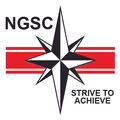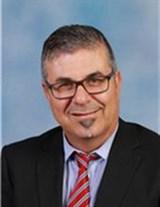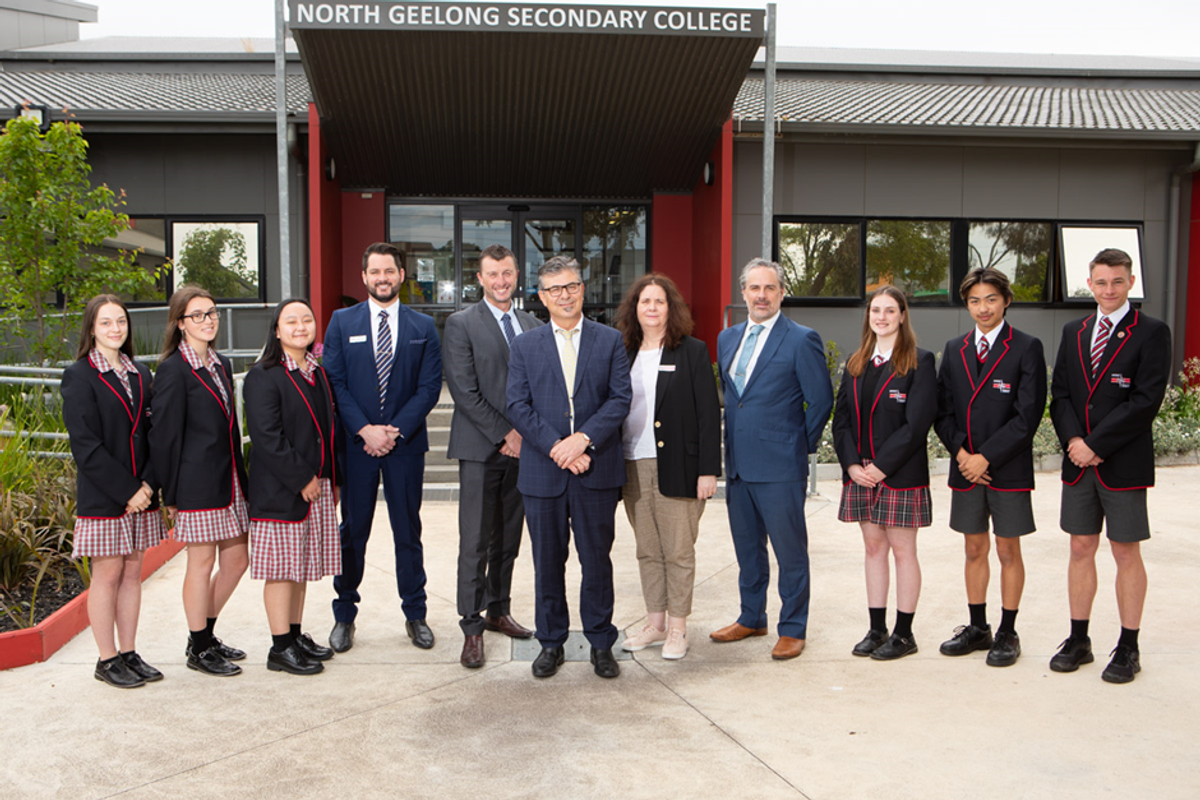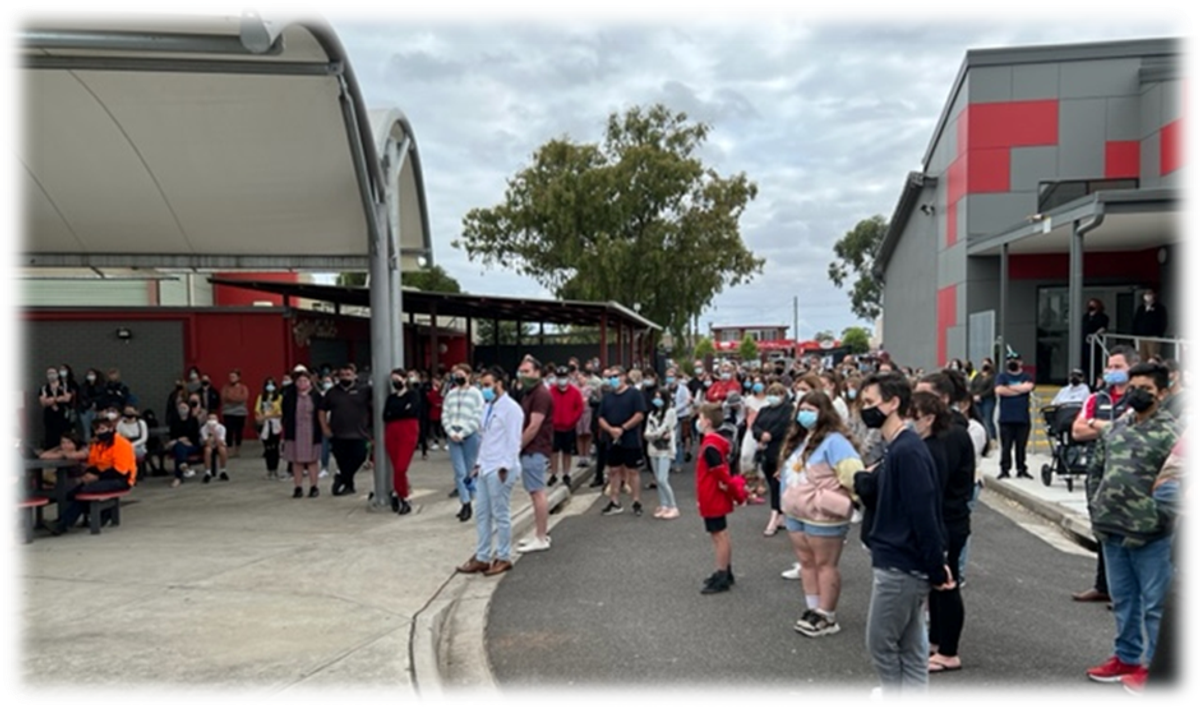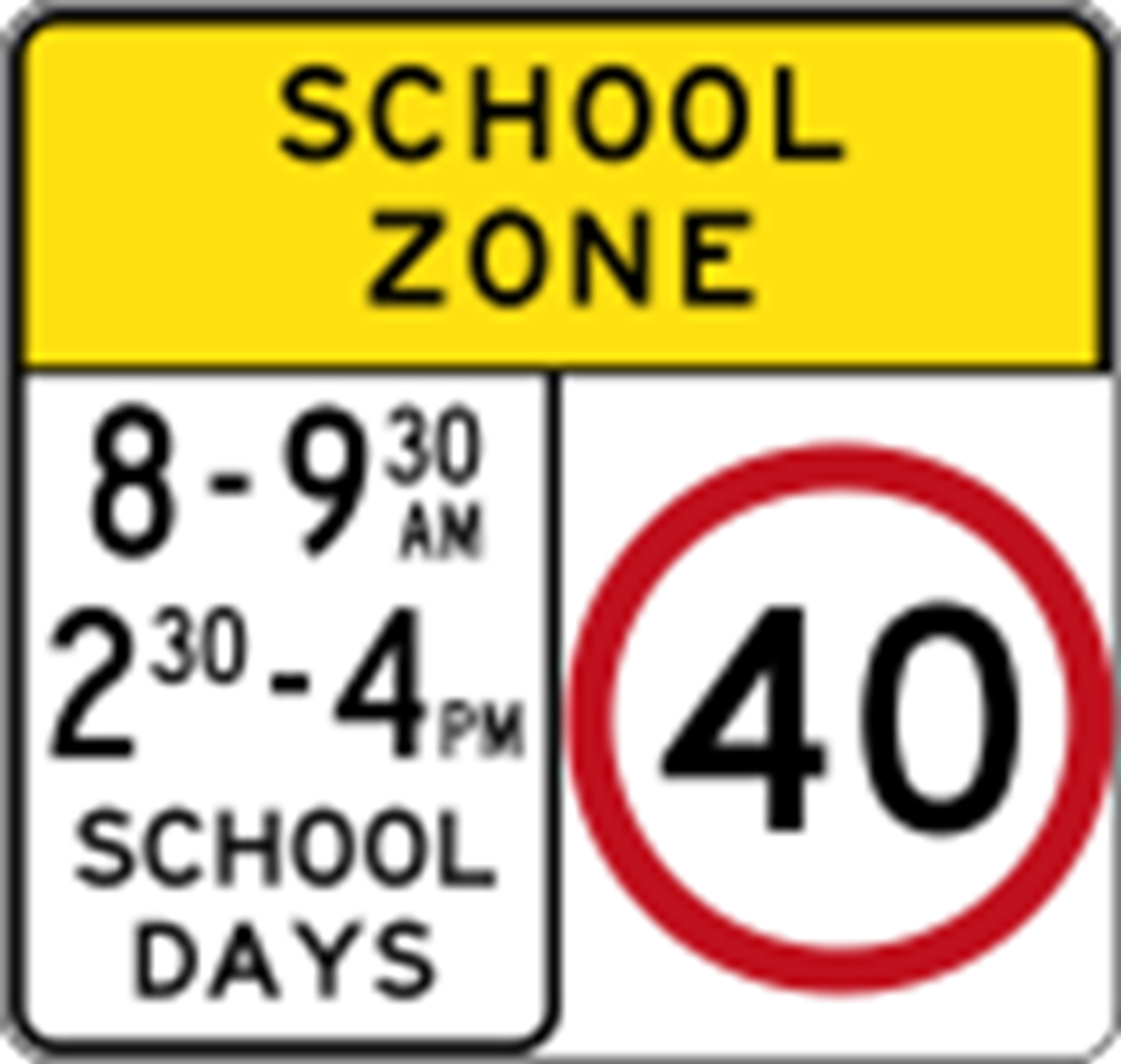PRINCIPAL'S REPORT
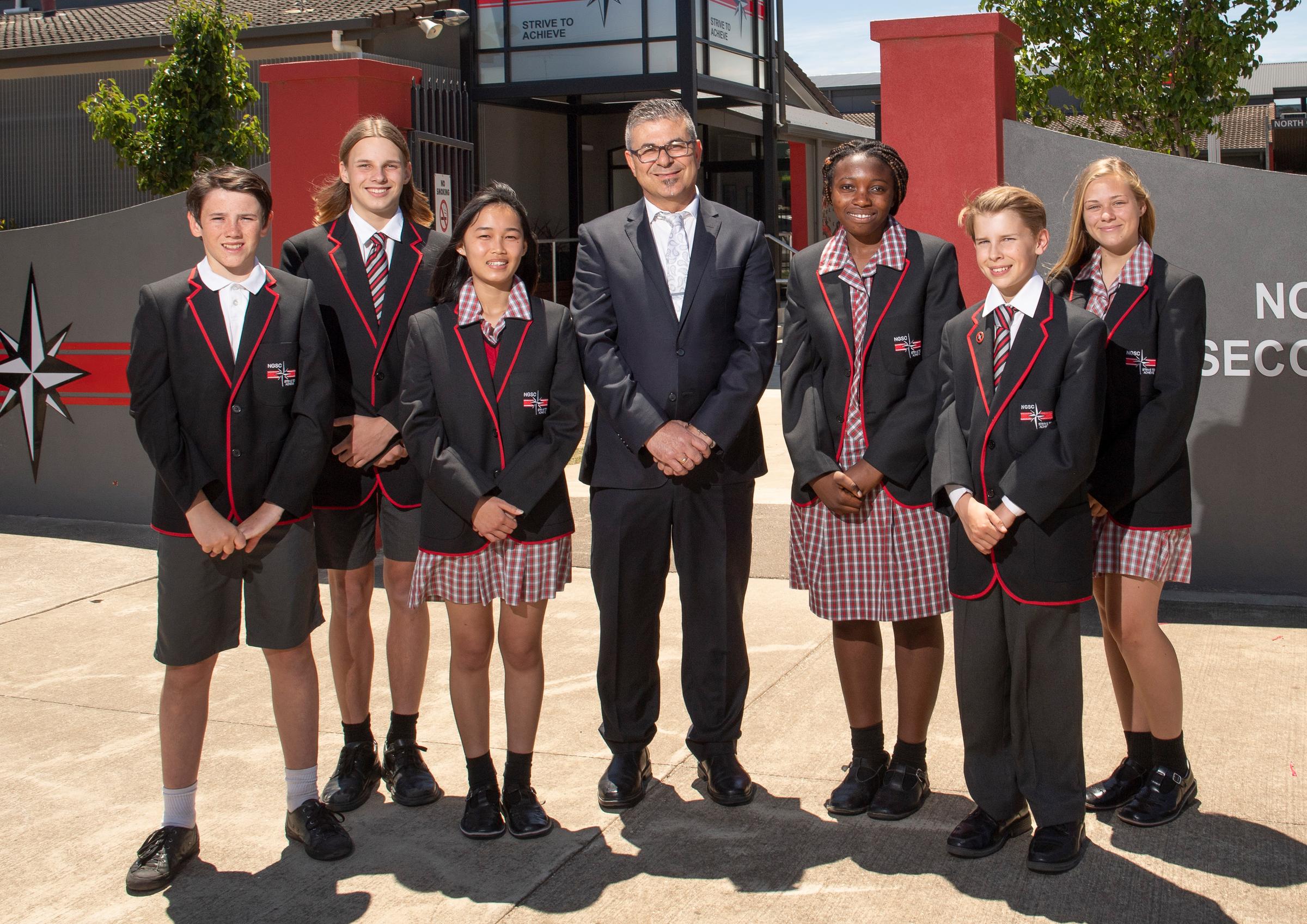
Nicholas Adamou
Principal
2022 Key Dates
| 21 to 23 Feb | Year 7 Camp 1 |
| 23 to 25 Feb | Year 7 Camp 2 |
| 2 March | School Photo Day |
| 10 March | Info/Open Night |
| 11 March | Photo Catch-ups |
| 14 March | Labour Day Public Holiday |
| 28 March | Athletics Day |
| 4 to 8 Apr | Year 10 Leadership Camp |
| 5 April | P/T Conferences 11:30 am to 6:30 pm |
On behalf of my leadership team and staff, I warmly welcome all students and parents/carers back for the 2022 school year. The year hasn’t started in the way any of us expected. Thank you yet again for your resilience and patience as we all work through these new health and school operational settings together. I know most of us have been impacted either directly or indirectly by the rise in Omicron cases. However, we are all optimistic as we navigate through these challenges, and we sincerely hope that the Covid19 situation will soon improve.
I hope you feel rested and refreshed after the most well deserved of all summer breaks and, like me, excited by the opportunities that the 2022 school year brings. I trust that all students are excited and now ready for teaching and learning.
I extend a special welcome to our new Year 7 students and their families who joined us this year. On Wednesday 2 February, at a welcoming parents/students and Chromebook distribution evening, I was pleased to meet and talk to many of our new Year 7 student families.
Also, special welcome to all new Year 8 to 12 students and their families to our school community.
In the last two weeks, it has been great to observe classes settled in their new Home Groups, developing a clear focus on achieving their goals and personal best for this academic year. I could see students and staff interacting in a very optimistic manner for the year ahead. We are all hoping that “face to face” teaching and learning will be the norm during this year and into the future.
To the Year 12 students, as they embark in their final year at the school, I take this opportunity to wish them a year full of success. Given the circumstances, I cannot promise that it will be a year without any challenges, however, I can guarantee that NGSC is in a great place to support all of our students to achieve their goals. The experiences of 2020/2021 have only strengthened our school community and the skills gained will be used to ensure safety within our school community.
Given the year we had last year’s Year 12 cohort has proven to be extremely resilient and achieved outstanding results. We wish them all the best with their future.
North Geelong Secondary College is a proud, high expectations school community. We place high importance on the way we look and behave in the wider community. Our aim is to continue improving the learning and teaching environment of our students, enabling all kind of learners to reach their full potential.
Once again, welcome back to what promises to be a great year for our school community. I look forward to meeting and working closely with as many parents/carers as possible during the course of the year.
Wishing all the students, staff and parents a great academic year.
Welcome to New and Returning Staff
I welcome the following new and returning staff to our College and wish them a very productive and enjoyable year. We are looking forward to working closely with our new staff to ensure the best possible teaching and learning opportunities are provided to our students.
New Staff
- Mr Callum Goode - Mathematics
- Ms Laura Melican – Science
- Ms Rebecca Travers – English
- Ms Rebekah Stewart – Science/IT
- Ms Isobel Peter - Music
- Mr Bayan Zareiadl– Mathematics/IT
- Ms Elizabeth Musgrove – English
- Mr Jarrod (Tex) Korewha- Psychology/Humanities
- Ms Renae Carmichael – English
- Ms Anna Dimentriev – ES (Sub-School Assistant)
- Ms Nicole Hinz – German Teacher Assistant
- Ms Victoria (Vic) Downey - School Nurse
Returning Staff
- Ms Georgie Hunter – Social Worker/Wellbeing Officer
School Council and School Council elections
School councils play a key role in Victorian government schools. Effective councils have a wide range of skills, expertise and knowledge to support good governance and provide the best possible educational outcomes for students.
The annual school council election process provides an opportunity to attract members keen to add value and bring their expertise and skills to assist the governance of the school.
All government schools with students enrolled in Year 7 and above are now required to have a student member category on council. The school election process for the student member category must occur at the same time as Parent and DET employee member elections.
Where a council has Community member positions, council can co-opt members following the election process and add to the council’s skills and expertise.
School council membership
Each school council’s constituting Order makes provision for its structure and membership:
- Parent members – parents of students at the school must comprise more than one third of the school council’s total membership. ‘Parent’ includes a guardian or person responsible for maintenance or with custody of a student of the school. Department employees are eligible for membership in this category as long as they have children attending the school and the Department employees do not work at the school (except for the principal who is a member of the Department employee member category) of that school council.
- Department employee members – must not be more than one third of the school council’s total membership. The principal is automatically included in this membership category and has full voting rights. Other staff (teaching and non-teaching) are elected or co-opted to this category. To be eligible for election to this category, a person must be a member of the Department of Education and Training (DET) employee electorate of the school.
- Student members– ‘student’ describes a student who is enrolled at and attends the school and is in Year 7 or above. Students are elected to this membership category or co-opted if a casual vacancy occurs. To be eligible for election, a student must be a member of the student body of the school. The number of student members is recorded in the Ministerial Order for the school council.
- Community members– is an optional membership category. The council’s membership schedule may include this category. If a council has the option of community members, the council decides who to approach and co-opt into this position. People are co-opted by the school council to a community member position to bring additional skills and perspectives. Community members hold the same rights, responsibilities and terms of office as elected members. Parents are eligible to be co-opted to a community member position, but Department employees are not. Students may also be co-opted to a community member position.
The North Geelong Secondary College, school council composition includes:
(9 x parents, 1 x community member, 2 x students and 5 x DET employees including the Principal - Voting members)
- 9 x parents (no DE&T employees)
- 1 x community member
- 5 x DE&T employees – teaching and non-teaching staff, including the Principal
- 2 x elected students
Total number of voting members 17.
The College Principal is the Executive Officer of the school council
This year we have four parent vacancies for a two year appointment (2022 & 2023), one community member and two DE&T employee member vacancies for a two year appointment (2022 & 2023). We also have one student vacancy for a two year appointment (2022 & 2023).
I call for parent nominations for the four vacancies and one Community member nomination. Any parent or community member that would like to discuss the role of Council or the role of the parent member on council please call the school and speak to Mrs Narelle Wiffen or the Principal.
Nomination forms can be obtained from Mrs Narelle Wiffen at the Administration Office. The closing day for nominations is Monday 21 February by 4:00 pm.
I take this opportunity to thank all school council members in particular the parent body for their outstanding contribution to the life of the College.
Covid-19 update and schools in 2022
DET has distributed Rapid Antigen Tests (RATs) for all students and staff for the first four weeks of the school year. Students and staff will participate in surveillance testing twice a week, Sunday evening or Monday morning and Wednesday evening or Thursday morning.
Students who show symptoms of COVID-19 cannot attend school and should get tested immediately and isolate until they receive a negative result. If your child is not experiencing COVID-19 symptoms and they have returned a negative RAT should continue to attend school.
Students who have recovered from COVID-19 do not need to participate in surveillance testing for 30 days after their isolation period has ended. For information on symptoms visit: https://www.coronavirus.vic.gov.au/symptoms-and-risks. For more information on how to get tested visit: https://www.coronavirus.vic.gov.au/taking-test-covid-19.
If your child returns a positive result, your child has COVID-19. You must:
- quarantine your child for seven days
- advise the school about the positive result
- Your child must stay home until their symptoms have resolved and they are well
- Everyone in your household is a close contact and must isolate for 7 days.
Reporting your child’s positive test
If your child was at school when they were infectious you need to report the positive case through the Student COVID-19 Test Portal (Student COVID-19 Test Portal) or you can notify the school in writing or by phone. You must also report your child’s positive test to the Department of Health via the COVID-19 Positive Rapid Antigen Test Self-Reporting Form or call centre on 1800 675 398.
Air Purifiers have also been delivered to our school community and have been placed strategically around the school. Classroom windows are to be opened to support the ventilation of the rooms. Outdoor teaching and learning spaces have been identified and teachers are encouraged to take their classes outdoors where possible.
Mask wearing indoors is compulsory for both staff and students unless there is a lawful mask exemption. Masks are not compulsory outdoors provided students and staff can physically distance.
Adaptability and resilience will be key to the success of this year, in particular the first few weeks of term.
Remote and Flexible learning will only be initiated as an absolute last resort. That can only be authorised by the Department of Education.
There is no longer to be individual contract tracing. The school will communicate positive staff and student cases to the community including year levels affected, dates, and any extracurricular activities the students or staff may have been involved in. This will alert parents to monitor and follow up any symptoms that their children may experience.
Workforce stress and staffing shortages will be a main priority, using all the main strategies, CRT, timetable flexibility, rescheduling activities. Splitting classes should be a last resort strategy as it represents larger cohorts and the risk of contamination. If splits are to occur, we will consider larger spaces. The CRT pool will be supplemented with the ‘surge’ pool, there are a number of recent retirees who are ready to support the SEIL (leadership support). ROL will have a recruitment strategy for teachers who are willing to re-engage to support schools.
Camps and excursions can go ahead, however, workforce pressure will be taken into consideration in the camps and excursions approval process.
Covid19 third dose vaccinations for 16 and 17 year-old young people
COVID-19 third-dose vaccinations are now available to 16 and 17 year-olds who had their second dose of a COVID-19 vaccine three or more months ago.
Supporting as many eligible students as we can to be vaccinated will help make our school as safe as possible.
Getting vaccinated is one of the most important steps we can all take to get direct protection against COVID-19.
How to book an appointment
There are many convenient and accessible options to access vaccinations. These include state-wide vaccination clinics, your local GP or pharmacy.
You can book your appointment in a few different ways, including:
- online: coronavirus.vic.gov.au/vaccine
- by phone: 1800 675 398 (Coronavirus Hotline)
- using the COVID-19 Vaccine Clinic Finder - COVID-19 Vaccine Clinic Finder | Australian Government Department of Health
- In person: talk to your local pharmacy, doctor, or attend one of the State Vaccination Centres.https://www.coronavirus.vic.gov.au/vaccination-information-children-and-teenagers
Please note that the dedicated COVID hotline for people in the Barwon South West region is
1300 942 241 8:30 am to 4:30 pm, 7 days a week.
School Zone Speed Limits
With the new school year started, it is an opportune time for school communities to be reminded of the importance of road safety around schools.
School Speed Zones are enforced from the commencement of the school year and parents/carers are reminded to adhere to all VicRoads School Speed Zones rules.
Also, parents/carers are reminded to take care and obey these parking signs and observe the Road Rules when picking up or dropping off students around schools. The City of Greater Geelong Parking and Information Officers monitor all supervised school crossings on a regular roster and issue infringements to drivers who stop in unsafe areas, such as “No Stopping” zones, within 20 metres of a school crossing, parallel to a yellow edge line, or if double parked, even for a moment to drop off or collect a student.
Queuing to enter a pickup/drop off zone can often lead to traffic congestion with vehicles being stationary in prohibited areas. Should the pickup/drop off zone be occupied with vehicles, to avoid the possibility of receiving an infringement it is advised to drive around the block and return when legal parking is available.
Statistics show that illegal parking around schools is greatly reduced due to an Officer’s presence and Council prefers to achieve these results though education and awareness.
Designated school speed zones: Specified times (8:00 – 9:30 am and 2:30 – 4:00 pm).
Further information, in regards to VicRoads speed limits around schools, can be found at: VicRoads School Speed Zones.
Also, please note that the school car park is out of bounds for all parents/carers. The car park is only for staff. It is imperative that parents DO NOT enter the carpark during pick up/drop off as they are placing students and staff at grave risk.
I wish to thank all parents/carers who always adhere to all traffic rules regarding school zones and also the school carpark rules. The safety of all children, staff and parents is paramount.
Schools' privacy policy
The Department of Education and Training (which includes all Victorian government schools, central and regional offices) values the privacy of every person and is committed to protecting information that schools collect.
All staff including contractors, service providers and volunteers of the Department, and our school, must comply with Victorian privacy law and this policy.
In Victorian government schools the management of ‘personal information’ and ‘health information’ is governed by the Privacy and Data Protection Act 2014 (Vic) and Health Records Act 2001 (Vic) (collectively, Victorian privacy law).
This policy explains how our school collects and manages personal and health information, consistent with Victorian privacy law.
For more information about privacy, refer to: Schools’ Privacy Policy — information for parents. This information is also available in ten community languages:
- Amharic
- Arabic
- Dari
- Gujarati
- Mandarin
- Somali
- Sudanese
- Turkish
- Urdu
- Vietnamese.
NGSC privacy policy
This policy is regularly reviewed and updated to take account of new laws and technology and the changing school environment when required.
During the ordinary course of your child’s attendance at our school, school staff will collect your child’s personal and health information when necessary to educate your child, or to support your child’s social and emotional wellbeing or health. Such information will also be collected when required to fulfil a legal obligation, including duty of care, anti-discrimination law and occupational health and safety law. If that information is not collected, the school may be unable to provide optimal education or support to your child or fulfil those legal obligations.
For example, health information may be collected through the school nurse, primary welfare officer or wellbeing staff member. If your child is referred to a specific health service at school, such as a Student Support Service officer, or school-engaged psychologist, the required consent will be obtained.
Our school may use online tools, such as apps and other software, to effectively collect and manage information about your child for teaching and learning purposes, parent communication and engagement; student administration; and school management purposes. When our school uses these online tools, we takes steps to ensure that your child’s information is secure. If you have any concerns about the use of these online tools, please contact us.
School staff will only share your child’s personal or health information with other staff who need to know to enable the school to educate or support your child, or fulfil a legal obligation.
When our students transfer to another Victorian government school, personal and health information about that student will be transferred to that next school. Transferring this information is in the best interests of our students and assists that next school to provide optimal education and support to students.
In some limited circumstances, information may be disclosed outside of the school (and outside of the Department of Education and Training). The school will seek your consent for such disclosures unless the disclosure allowed or mandated by law.
Our school values the privacy of every person. When collecting and managing personal and health information, all school staff must comply with Victorian privacy law. For more information about privacy including about how to access personal and health information held by the school about you or your child, see our school’s privacy policy: https://www.education.vic.gov.au/Pages/schoolsprivacypolicy.aspx
Definitions
Personal information is information or opinion, whether true or not, about a person whose identity is apparent, or can reasonably be ascertained, from the information or opinion – that is recorded in any form. For example, a person's name, address, phone number and date of birth (age). De-identified information about students can also be personal information.
Health information is information or opinion about a person’s physical, mental or psychological health or disability, that is also personal information – whether in writing or not. This includes information or opinion about a person’s health status and medical history, immunisation status and allergies, as well as counselling records.
Sensitive information is information or opinion about a set of specific characteristics, including a person’s racial or ethnic origin, political opinions or affiliations, religious beliefs or affiliations, philosophical beliefs, sexual orientation or practices; or criminal record. It also includes health information.
What information do we collect?
Our school collects the following type of information:
- information about students and their families, provided by students, their families and others
- information about job applicants, staff, volunteers and visitors; provided by job applicants, staff members, volunteers, visitors and others.
How do we collect this information?
Our school collects information in a number of ways, including:
- in person and over the phone: from students and their families, staff, volunteers, visitors, job applicants and others
- from electronic and paper documentation: including job applications, emails, invoices, enrolment forms, letters to our school, consent forms (for example: enrolment, excursion, Student Support Services consent forms), our school’s website or school-controlled social media
- through online tools: such as apps and other software used by our school
- through any CCTV cameras located at our school.
- Collection notices
When our school collects information about you, our school takes reasonable steps to advise you of how the information will be handled. This includes the purpose of the collection, and how to access, update and correct information held about you. For information about students and their families, a collection notice is provided to parents (or students who are mature minors) upon enrolment.
Unsolicited information about you
Our school may receive information about you that we have taken no active steps to collect. If permitted or required by law, our school may keep records of this information. If not, we will destroy or de-identify the information when practicable, lawful and reasonable to do so.
Why do we collect this information?
Primary purposes of collecting information about students and their families
Our school collects information about students and their families when necessary to:
- educate students
- support students’ social and emotional wellbeing, and health
- fulfil legal requirements, including to:
- take reasonable steps to reduce the risk of reasonably foreseeable harm to students, staff and visitors (duty of care)
- make reasonable adjustments for students with disabilities (anti discrimination law)
- provide a safe and secure workplace (occupational health and safety law)
- enable our school to:
- communicate with parents about students’ schooling matters and celebrate the efforts and achievements of students
- maintain the good order and management of our school
- enable the Department to:
- ensure the effective management, resourcing and administration of our school
- fulfil statutory functions and duties
- plan, fund, monitor, regulate and evaluate the Department’s policies, services and functions
- comply with reporting requirements
- investigate incidents in schools and/or respond to any legal claims against the Department, including any of its schools.
Primary purposes of collecting information about others
Our school collects information about staff, volunteers and job applicants:
- to assess applicants’ suitability for employment or volunteering
- to administer employment or volunteer placement
- for insurance purposes, including public liability and WorkCover
- to fulfil various legal obligations, including employment and contractual obligations, occupational health and safety law and to investigate incidents
- to respond to legal claims against our school/the Department.
When do we use or disclose information?
Our school uses or discloses information consistent with Victorian privacy law, as follows:
- for a primary purpose – as defined above
- for a related secondary purpose that is reasonably to be expected – for example, to enable the school council to fulfil its objectives, functions and powers
- with notice and/or consent – including consent provided on enrolment and other forms
- when necessary to lessen or prevent a serious threat to:
- a person’s life, health, safety or welfare
- the public’s health, safety or welfare
- when required or authorised by law – including as a result of our duty of care, anti-discrimination law, occupational health and safety law, reporting obligations to agencies such as Department of Health and Human Services and complying with tribunal or court orders, subpoenas or Victoria Police warrants
- to investigate or report unlawful activity, or when reasonably necessary for a specified law enforcement purpose, including the prevention or investigation of a criminal offence or seriously improper conduct, by or on behalf of a law enforcement agency
- for Departmental research or school statistics purposes
- to establish or respond to a legal claim.
A unique identifier (a CASES21 code) is assigned to each student to enable the school to carry out its functions effectively.
Student transfers between Victorian government schools
When a student has been accepted at, and is transferring to, another Victorian government school, our school transfers information about the student to that school. This may include copies of the student’s school records, including any health information.
This enables the next school to continue to provide for the education of the student, to support the student’s social and emotional wellbeing and health, and to fulfil legal requirements.
NAPLAN results
NAPLAN is the national assessment for students in years 3, 5, 7 and 9, in reading, writing, language and numeracy.
When a student transfers to another Victorian government school, their NAPLAN results are able to be transferred to that next school.
Additionally, a student’s NAPLAN results are able to be provided to the student’s previous Victorian government school to enable that school to evaluate their education program.
Responding to complaints
On occasion, our school and the Department’s central and regional offices receive complaints from parents and others. Our school and/or the Department’s central or regional offices will use and disclose information as considered appropriate to respond to these complaints (including responding to complaints made to external organisations or agencies).
Find out more about the privacy complaints process.
Accessing your information
All individuals, or their authorised representative(s), have a right to access, update and correct information that our school holds about them.
Access to student information
Our school only provides school reports and ordinary school communications to parents who have a legal right to that information. Requests for access to other student information must be made by making a Freedom of Information (FOI) application through the Department’s Freedom of Information Unit (see below).
In some circumstances, an authorised representative may not be entitled to information about the student. These circumstances include when granting access would not be in the student’s best interests or would breach our duty of care to the student, would be contrary to a mature minor student’s wishes or would unreasonably impact on the privacy of another person.
Access to staff information
School staff may first seek access to their personnel file by contacting the principal. If direct access is not granted, the staff member may request access through the Department's Freedom of Information Unit.
Storing and securing information
Our school takes reasonable steps to protect information from misuse and loss, and from unauthorised access, modification and disclosure. Our school stores all paper and electronic records securely, consistent with the Department’s records management policy and information security standards. All school records are disposed of, or transferred to the State Archives (Public Record Office Victoria), as required by the relevant Public Record Office Standard.
When using software and contracted service providers to manage information, our school assesses these according to the appropriate departmental processes. One example of this is that staff passwords for school systems are strong and updated on a regular basis, consistent with the Department’s password policy.
Updating your information
We endeavour to ensure that information about students, their families and staff is accurate, complete and up to date. To update your information, please contact our school’s general office.
